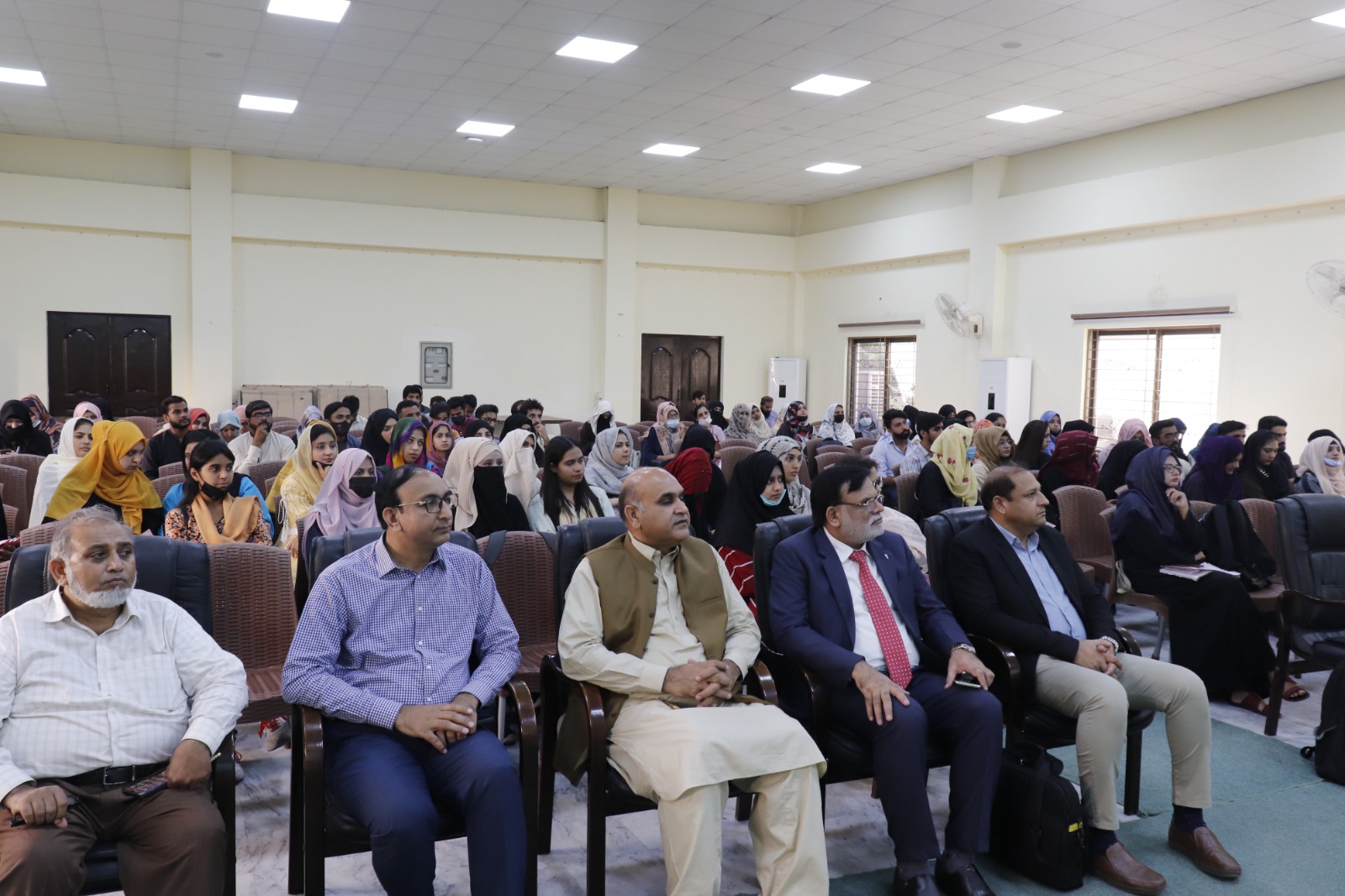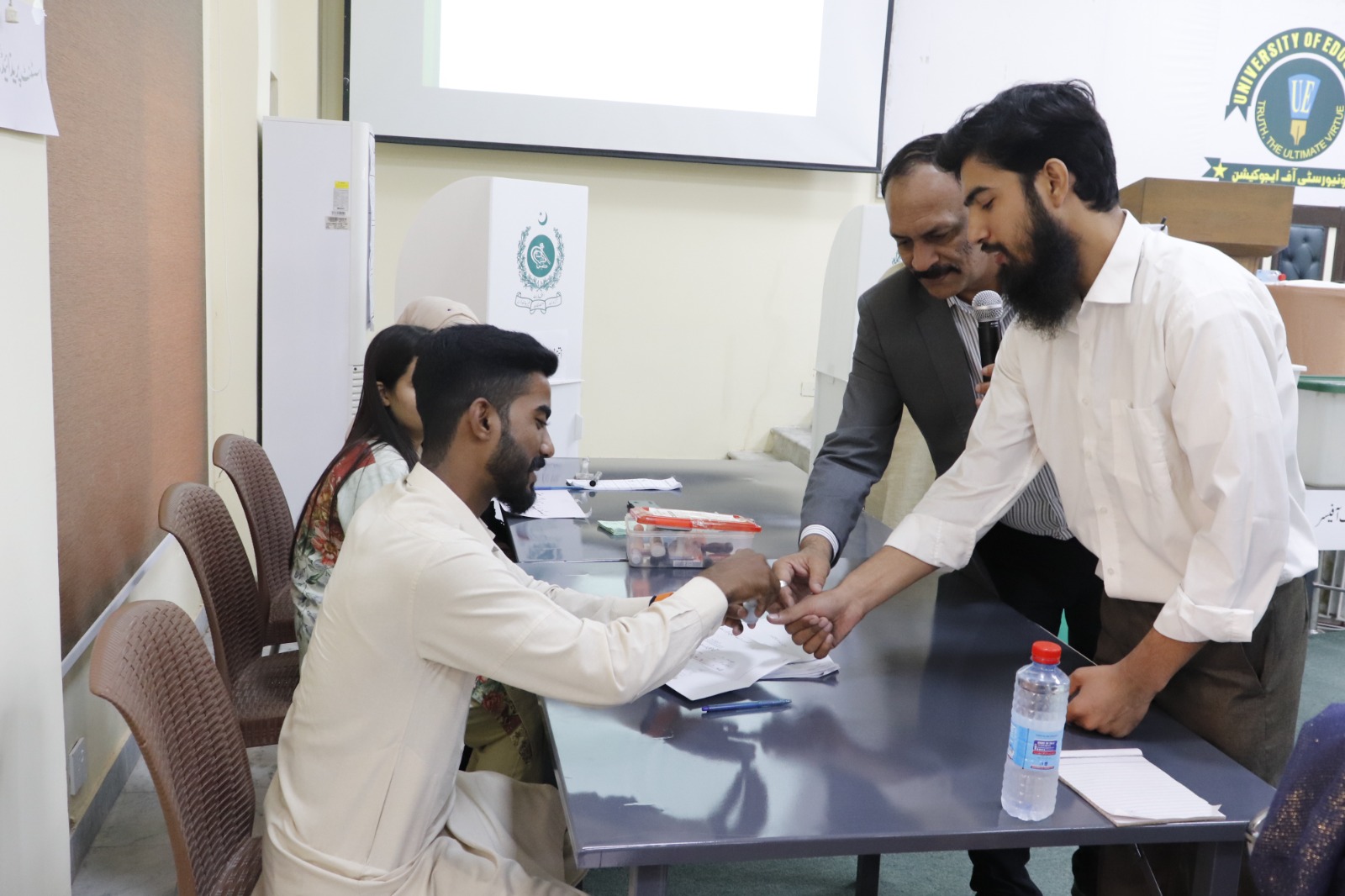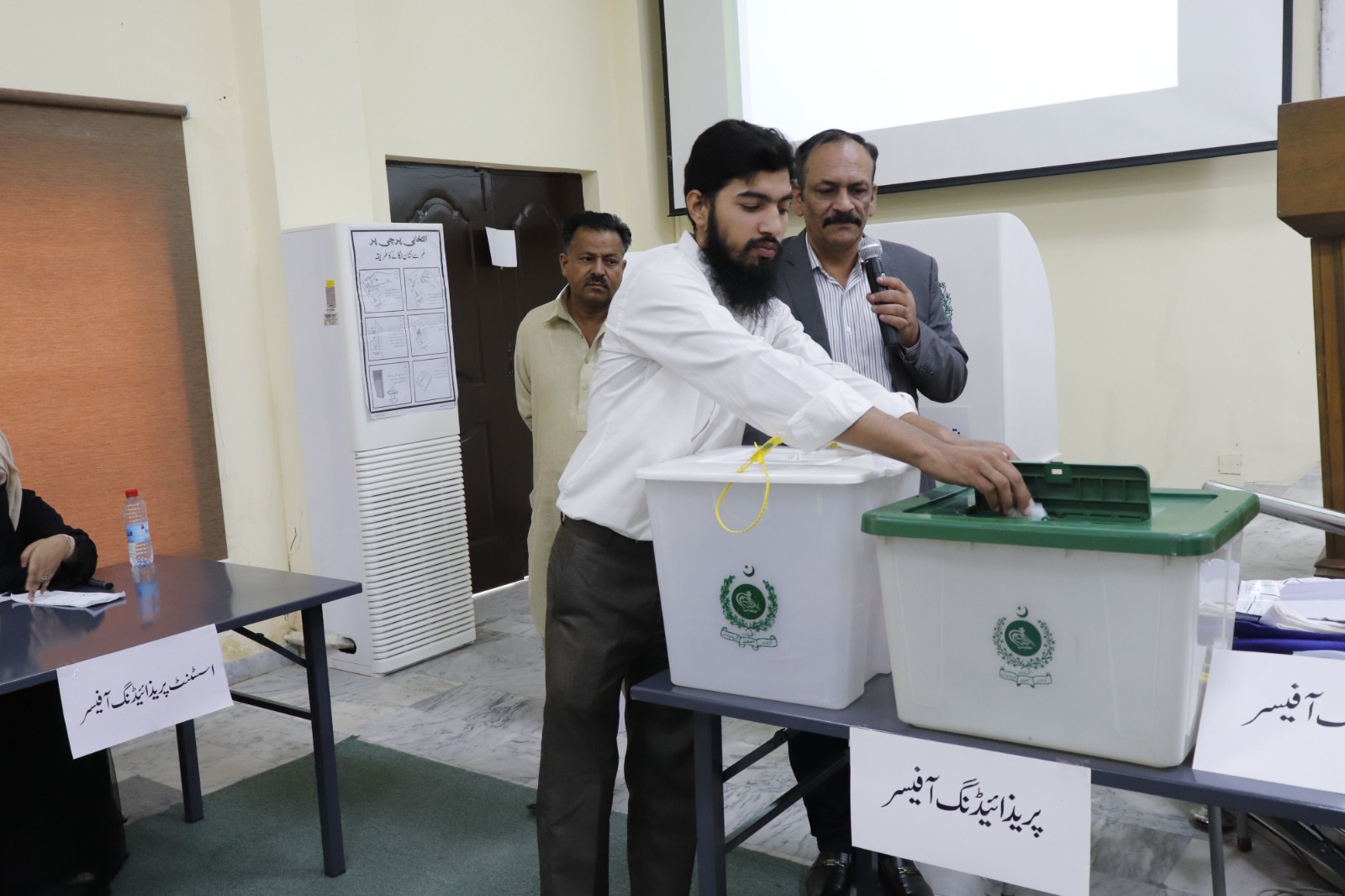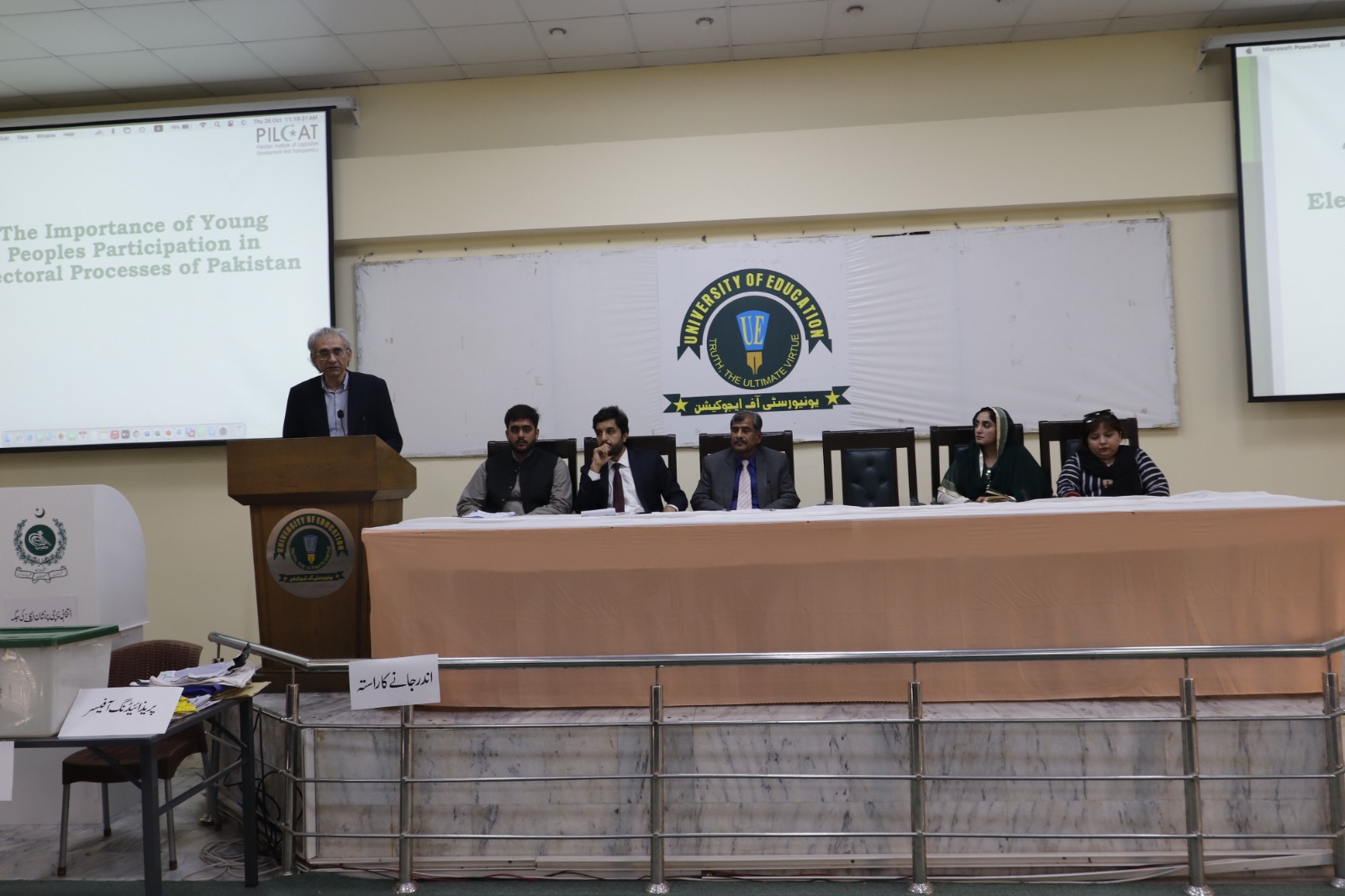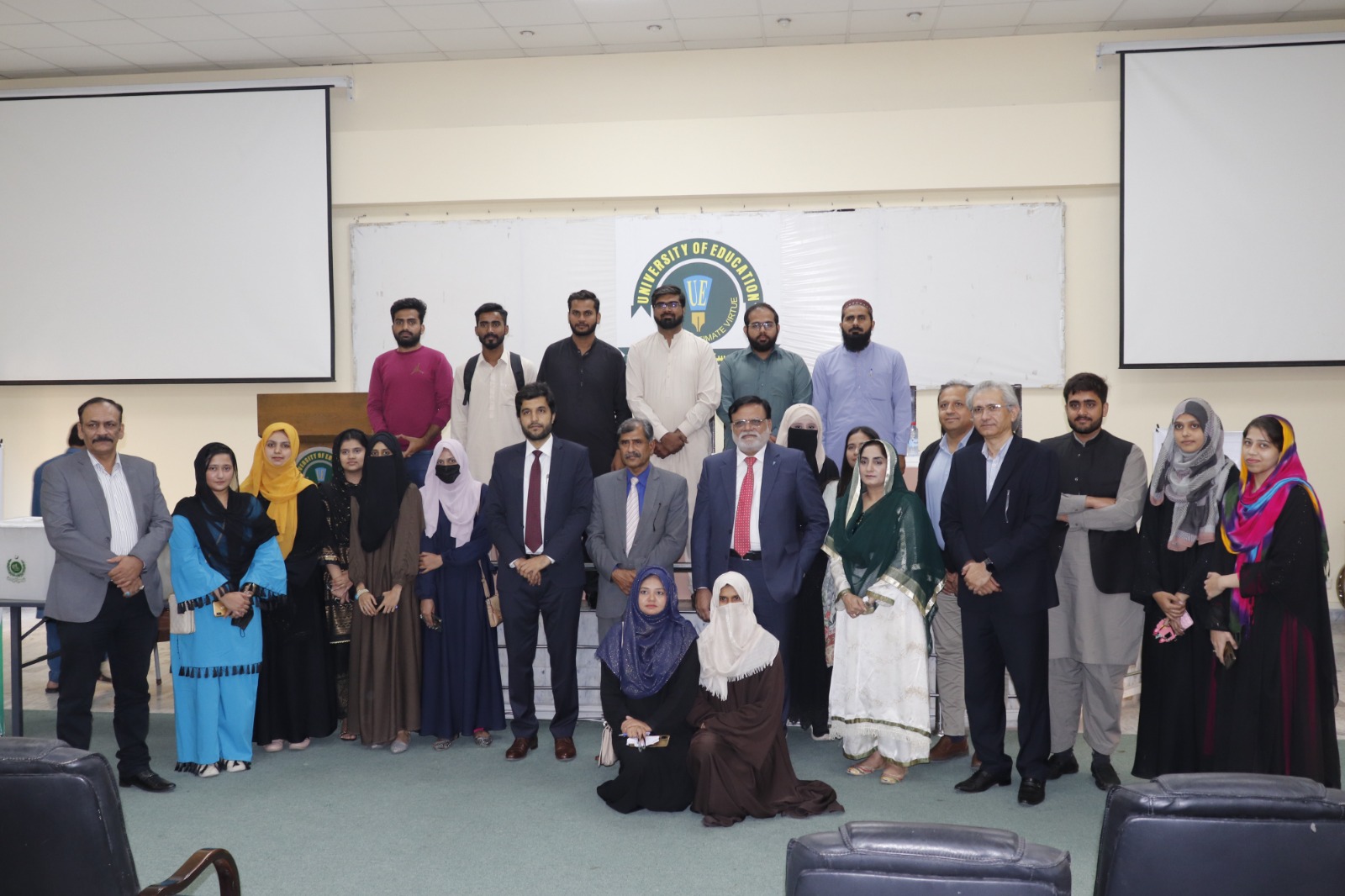 October 26: A consultative session with the students and faculty of the University of Education, Lahore was held at their Multi-Purpose Hall in collaboration with UNDP Pakistan. Mr. Sain Baksh Channar, Joint Provincial Election Commissioner and Mr. Shabbir Khan, Deputy Director, Gender and Social Inclusion, represented the Election Commission of Pakistan (ECP) at the consultative session. Mr. Muhammad Qasim Janjua, Program Advisor, Elections and Democratic Space, Strengthening Electoral and Legislative Processes (SELP), Democratic Governance Unit, UNDP Pakistan was also present during the consultative session.
October 26: A consultative session with the students and faculty of the University of Education, Lahore was held at their Multi-Purpose Hall in collaboration with UNDP Pakistan. Mr. Sain Baksh Channar, Joint Provincial Election Commissioner and Mr. Shabbir Khan, Deputy Director, Gender and Social Inclusion, represented the Election Commission of Pakistan (ECP) at the consultative session. Mr. Muhammad Qasim Janjua, Program Advisor, Elections and Democratic Space, Strengthening Electoral and Legislative Processes (SELP), Democratic Governance Unit, UNDP Pakistan was also present during the consultative session.
Dr. Qudsia Fatima, Assistant Professor at the University of Education, welcomed the participants and highlighted the importance of the session. She invited the Chair Prof. Dr. Muhammad Aalam Saeed, Pro Vice Chancellor of the University of Education for the welcome remarks. Prof. Dr. Muhammad Aalam Saeed extended a warm welcome to the participants and expressed his heartfelt gratitude to PILDAT and UNDP for organizing the session focusing on the vital role of youth participation in Pakistan’s electoral processes. In addition, he encouraged young people to use their vote. He spoke on how young people are unhappy with the current electoral system but that their involvement in the system is the only way to change it.
Mr. Faheem Ahmed Khan, Senior Projects Manager PILDAT, introduced the panel members. The panel members included Mr. Sain Baksh Channar Joint Provincial Election Commissioner and Mr. Shabbir Khan, Deputy Director, Gender and Social Inclusion. The Youth Representatives included Ms. Farha Rehman and Mr. Hussain Butt, while the university was represented by Dr. Samra Bashir, Assistant Professor of Political Science at the University of Education, Lahore.
During his presentation, Mr. Faheem Ahmed Khan, Senior Projects Manager PILDAT discussed the demographic distribution of registered voters in Pakistan, highlighting 45% of the total registered voters belonging to the age group of 18-35 years. Additionally, he provided a comparative analysis of the voting behaviors shown by the young population of Pakistan and India. Notably, the youth voter participation in India surpassed the overall voter turnout seen in the most recent Indian elections. The panelists agreed that low youth voter participation was a genuine problem, not a myth and gave their views on the low youth voter participation.
Mr. Hussain Butt, the Youth Representative, shared his personal voting experience, describing it as a lengthy and somewhat challenging process. He emphasized the need for simplifying the voting procedure to enhance youth participation in the electoral process. Additionally, he expressed the prevalent lack of trust among the youth in the system’s ability to ensure the sanctity of the ballot.
The Youth Representative, Ms. Farha Rehman, highlighted that the youth refrain from casting their votes due to a prevailing sense of disillusionment with the system. She noted that many young people lack trust in both democracy and their elected representatives. She also acknowledged the vital role of voting in strengthening democracy. Ms. Rehman pointed out that the youth often perceive political parties as offering mere slogans without practicality, which contributes to their sense of discontentment.
Sain Baksh Channar, Joint Provincial Election Commissioner Punjab, elaborated on the efforts undertaken by the Election Commission of Pakistan (ECP) to impart knowledge about the voting process to the youth. He emphasized that it was the shared responsibility of both the public and political parties to strengthen the electoral system and provide information about voting to the masses and their supporters.
Mr. Shabbir Khan, Deputy Director of Gender and Social Inclusion, ECP, emphasized the vital role of youth in the electoral process, pointing out widespread mistrust issues that extend beyond a single institution’s responsibility. He stressed the need to change the public’s perception of voting and called for a behavioral change towards the polling exercise. He went on to say that the change will only occur through active youth participation in the electoral processes. Mr. Shabbir also detailed the voter registration process and encouraged students to cast their votes not just for political parties but for the preservation and strengthening of democracy as a whole.
Dr. Samra Bashir, Assistant Professor at the University of Education, Lahore, stressed the importance of educating the youth about their voting rights. She observed a lack of motivation among young people to engage in the electoral process and emphasized the necessity to promote political activities in the university and also mentioned that steps should be taken to revive the Student Unions.
The session was attended by a total of 77 students out of which 61 (79%) were young women and 16 (21%) were young men.
Following the panel discussion, students enthusiastically took part in a mock polling exercise, actively casting their votes. Their eagerness to experience the democratic process firsthand and engage in meaningful discussions about the topics presented during the panel discussion was evident.
